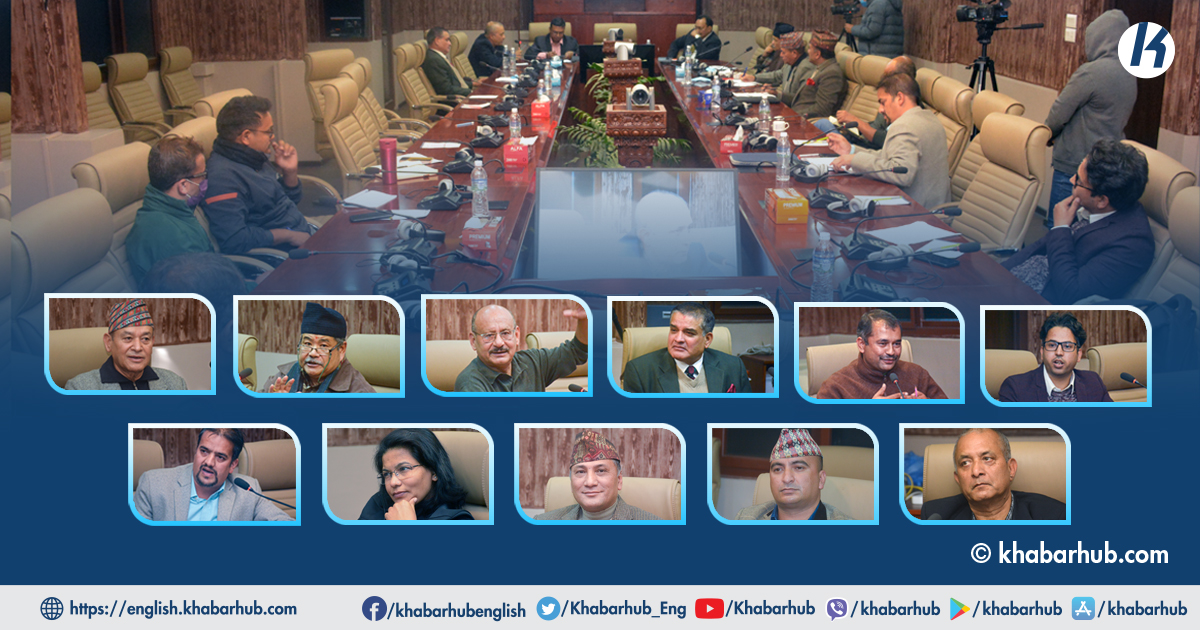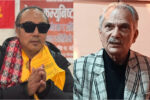KATHMANDU: Nepal’s formerly high-ranking army, intelligence, police, Armed Police Force, and security officials have drawn the attention of the government and existing security apparatus towards growing terrorism threats in Nepal and India.
Taking part in a debate on “Terrorism Threats in South Asia” organized by Khabarhub at the Pavilion Hall in Durbar Marg, Kathmandu, on Friday, former head of Nepal’s main intelligence agency National Investigation Department (NID), retired Inspector Generals of Armed Police Force and high-ranking army and police officers called on the government to be vigilant as militants threats were growing in the region following the Taliban takeover of Afghanistan. The participants also warned the government to pay attention to terrorist acts and cautioned over the potential use of Nepalese territories against India by the terror groups.
Officials suggested the government beef up mechanisms related to the monitoring of terrorist activities, money laundering, among others.
Participants pointed out several counter-terrorism challenges, including the potential use of the open border by terrorist groups, mostly to carry out activities against India. Likewise, Nepal equally faced legal, technical, resource challenges and threats of terrorist groups that could misuse Nepal’s land against India.
They said that the government of Nepal should remain extremely cautious to ensure that terrorist outfits do not use the country as a springboard against other countries. Concerns were also raised about the increasing risk of terrorism threats in Nepal in view of the growing rise of terrorist activities in South Asia and beyond.
Speaking at the program, Devi Ram Sharma, Former Chief of the National Investigation Department (NID), said that Nepal should remain extremely vigilant of terrorism activities and threats.

Though there are no terrorist groups active in the country it could never be ruled out that terrorists could enter the country taking advantage of the open border between Nepal and India and may formulate plans to execute terrorist activities in any other country. “Nepal is always under a threat when a foreign dignitary and VVIPs visit Nepal,” he added.
Kishor Kumar Lama, Inspector General of Armed Police Force (Retd) said no terrorist group had targeted Nepal so far.

However, Nepal and its capital, Kathmandu, have become a hub of terrorism activities as people dealing with Narcotics, criminal groups, cyber attackers, among others, sometimes activated their networks here, according to him.
Nepal Army, Nepal Police, Armed Police Force, and the Central Investigation Bureau have played vital roles to control such activities. “All countries, including Nepal, should enforce a multi-agency approach to control terrorism,” he added.

Likewise, Dr Thakur Mohan Shrestha, Additional Inspector General of Police (Retd) and President of Nepal Citizen Campaign said that terrorism is linked with corruption. “Terrorism has no shape and direction, terrorist activities can shift from “Kabul to Kashmir, and Kashmir to Kathmandu”.
Hemanta Malla, former DIG of Nepal Police, dubbed the Taliban as a religious movement, not a political one. “As it is a religious movement, it’s difficult to predict where the movement will head towards. A new form of terrorism may rise in India as there was growing extremist activities between Hindus and Muslims, he opined.

Surveillance along the border should be increased, and sufficient resources given to the Border Security personnel to curb any terrorist activities on the border areas. Nepal should focus on “National Security Policy”, he added.
Meanwhile, Nepal should also remain alert of hardliner Islamist groups’ anti-India activities, said Malla. He pointed out that the Indian Mujahideen were also sporadically using Nepali land to carry out anti-India activities.

Suresh Sharma, Nepal Army Brigadier General (Retd), said that political instability, lack of accountability and responsibility, corruption, among others give birth to terrorism. “To identify and control terrorism activities, every nation should have a mechanism. Nepal’s intelligence activities and policy are very weak and don’t have enough capabilities to control terrorism. As South Asia is vulnerable to terrorism, Nepal can’t feel secure,” he argued.

Similarly, Brijendra Gautam, Brigadier General (Retd) of Nepal Army said that a huge amount of donation has come to Madrassa and authorities are least bothered about the activities going on inside them.
“Political will is vital to control terrorism,” he said, adding that Nepal and its leaders should have a clear vision for counter-terrorism measures in the country.

Security expert, Uddav Pyakural emphasized finding the cause and consequences of terrorism and identifying the ‘motives of revenge’.
He said that the open border is not only the problem. “The country which has tight security like India and Pakistan, or the United States also face deadly attacks like 26/11 Mumbai attack.”
Similarly, Indra Adhikari, a security expert, said that the country which has a comprehensive security mechanism also comes under terrorist attacks.

“We should not only think about the land but also about the airport and the sky,” she said, adding that as Nepal has an easy visa procurement process for foreigners, they can also be used for terrorism activities.
She suggested strong coordination between security intelligence and the use of modern information technology to tackle terrorism.
The program was organized on the occasion of November 26, 2008, terrorism attacks in the Indian financial city of Mumbai.













Comment